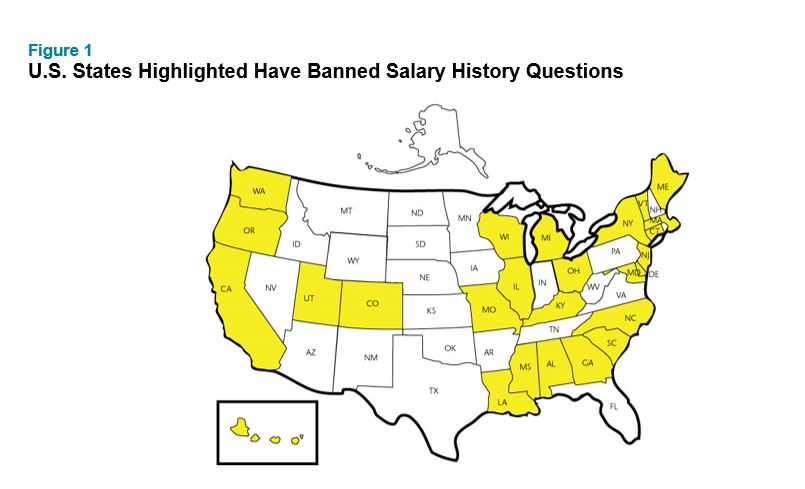From California to New York, here’s a roundup of leading fair pay laws in the U.S., and tips for balancing local regulation with global consistency to promote shared standards within your firm.

Eliminating pay inequities based on gender, race, ethnicity, and other protected statuses is a major topic of conversation across all types of organizations — and for good reason. In addition to maintaining compliance, employers are now motivated by many other factors to close any existing gaps, including the advent of technologies that drive increased pay transparency, clear links between diversity and improved business performance, protecting brand reputation, and growing societal pressure. In sum, addressing inequities and remaining competitive in today’s challenging talent market now go hand-in-hand.
However, the growing patchwork of pay equity laws across the U.S. does not necessarily make it easy for companies to drive change on a consistent basis. In fact, 42 states in the U.S. have expanded upon the federal Equal Pay Act of 1963 to develop various regulations designed to better safeguard the categories listed above. To remain on top of existing and emerging legislative actions, companies must think in a more holistic fashion and create consistent approaches to their compensation structures and systems grounded in broad principles of fairness and backed by deep local expertise.
This is especially true for companies with employees in multiple states that are covered under different laws. In such cases, firms must remain compliant while also determining if it makes sense to apply certain legal standards to all employees to create consistency in pay and hiring practices across the organization. For example, as we covered in our recent article, Equal Pay Laws Shine a Light on the Difficulty of Defining “Equal,” the California Fair Pay Act highlights the challenge of navigating the many legal definitions of fair pay compared to taking a statistical or pragmatic approach to eliminating unexplained pay gaps within an organization.
While states and smaller jurisdictions are constantly passing new pay equity laws and modifying existing ones, some of the strongest state laws today are in California, Colorado, Louisiana, Massachusetts, New Jersey, New York, Oregon, and Pennsylvania. In this article, we summarize key takeaways of each of these state laws to provide a guide for navigating the current legislative landscape and to see where future pay equity regulation may be headed in other jurisdictions throughout the U.S. Taking these laws into account can help organizations think through the right areas to drive firm-wide consistency, while also remaining compliant with key local regulations.
California Fair Pay Act AB 168
Effective January 1, 2018, this bill adds two key aspects to the original California Equal Pay Act of 1949, which prohibited an employer from paying its employees less than others for equal work due to gender. There were numerous loopholes in the old law, making it hard to enforce its intent in practice. Since then, there have been many amendments, the most recent stating the following:
- Employers are prohibited from seeking or relying on salary history of an applicant when making compensation decisions
- Applicant is defined as someone seeking employment, who is not currently employed by that employer
- Upon reasonable request, employers must provide the applicant with a pay scale for the specific position for which he or she is interested
- Pay scale is defined as the salary range
- Reasonable request refers to a request made after an initial interview, thus excluding plaintiff lawyers or competitors
Colorado Equal Pay for Equal Work Act SB 19-085
One of the strictest pay equity laws to date, Colorado’s Equal Pay for Equal Work Act, signed on May 22, 2019, is scheduled to go into effect on January 1, 2021. Similar to other enhanced pay equity regulations, this law prohibits all employers from discriminating based on sex (including gender identity) by paying less for substantially similar work in terms of skill, effort and responsibility. Other key highlights include:
- Increased transparency by permitting employees to discuss compensation with other colleagues
- Prohibiting employers from asking about job candidates’ wage history or relying on wage history to determine a pay rate
- Encouragement of regular self-audits or assessments of existing compensation practices
However, there are two specific requirements to help current and prospective employees learn about job opportunities that make this equal pay law especially unique:
- Employers must announce, post or share all opportunities for promotion with current employees on the same calendar day
- For each job posting, employers must disclose the hourly or salary compensation, or its compensation range, and a general description of all benefits and other rewards offered
Louisiana Equal Pay for Women Act SB 136
In an effort to eliminate the highest wage gap in the nation, on April 25, 2019, Louisiana approved a bill that focuses on the promotion of transparency in the workplace. The prior law prohibited employees from disclosing information about pay or wages to other employees. To help establish pay parity, the new legislation prohibits employers from taking actions against employees for inquiring about, discussing, or disclosing their wages or those of other employees.
“When there is transparency, there is fairness, and my legislation is just one of the many steps our state must take to ensure that everyone in the workplace is paid equally. It's simply the right thing to do.” – Louisiana State Senator J.P. Morell
Massachusetts Pay Equity Act Statute 2016, c. 177
Effective July 1, 2018, this Act strengthens existing pay equity provisions by clarifying that employers cannot pay workers less than what they pay employees of a different gender for comparable work.
- Comparable work is defined as similarity of skill, effort, responsibility, and working conditions required for positions, even where the job titles and duties of those positions are different
- Wages refers to not just salary, but also bonuses, benefits, commissions and housing allowances
- Exceptions include performance-based pay, location or an employee’s background
New Jersey Diane B. Allen Equal Pay Act
Effective July 1, 2018, it is unlawful for employers to pay employees of any protected class under the New Jersey Law Against Discrimination (LAD) at a lesser rate than other employees who perform in similar working conditions, unless the differential is based on a legitimate business reason.
- Protected classes under LAD include sex, race, creed, color, national origin, ancestry, nationality, disability, age, pregnancy or breastfeeding, marital, civil union or domestic partnership status, affectional or sexual orientation, gender identity or expression, military status, and genetic information or atypical hereditary cellular or blood traits
- “Substantially similar” work is not defined, leaving discretion to the courts and forcing employers to proactively define their own taxonomies of substantially similar jobs
- An employer should only pay a member of a protected class lower compensation if there is a legitimate reason, such as seniority or merit, or if the employer can demonstrate that the differential is based on factors that are not protected characteristics and solely for business necessity (and only if there are alternative business practices that would serve the same purpose without producing the wage differential)
New York Intro 1253-A
Effective October 31, 2017, this bill decrees that it is an unlawful and discriminatory practice to ask about or rely upon the salary history of a job applicant to determine compensation during the hiring process.
While firms can discuss a candidate’s salary expectations, mandatory disclosure of prior wage, salary, benefits or any other form of compensation is strictly prohibited. Any breaches that occur may lead to a fine of up to $250,000. To adhere to these new restrictions, firms across all industries are adjusting their hiring processes and recruiting methods to remove all pay history questions from interviews, candidate screenings, and application forms.
Organizations are now focused on gathering the following data points to inform appropriate compensation levels:
- Internal peer compensation ranges
- External market data
- Candidate pay level expectations
- Candidate experience
- Proof of production for front-office roles rather than proof of pay
- Development of specific processes and talking points when discussing compensation with impacted candidates
Oregon ORS 652.220
For many years now, Oregon law has prohibited employers from discriminating between genders when it comes to pay for work of comparable character. In 2017, this bill was amended to prohibit firms from asking applicants for salary history or using previous salary of an applicant in determining compensation. In addition to banning current and past salary screenings, this bill also prevents employers from:
- Discriminating against employees based on his/her status as a member of a protected class
- Paying wages or other compensation to any employee at a greater rate than what is paid to an employee of a protected class for similar work and skill levels
- Discriminating against an employee if he or she has filed a complaint under the law or has testified, is about to testify, or is believed to likely testify in an investigation or proceedings related to the law
Additionally, employers must post a notice outlining the requirements of the legislation in every operating establishment.
Pennsylvania Equal Pay Law
Pennsylvania announced new legislation on April 2, 2019, to modernize Pennsylvania’s “antiquated” Equal Pay Act, according to lawmakers. The updated law primarily aims to ensure that any individual, regardless of gender, is paid equally compared to their colleagues who are doing the same job. The amended law focuses on:
- Broadening the scope of the current law to include more employees by expanding the definition of “employees”
- Addressing discrimination as it relates to fringe benefits (in the past, only wage was considered)
- Protecting employees from retaliation when inquiring about wage information
- Ensuring wages are based on bona fide factors
- Providing workers with the ability to collect unpaid wages when an employer is found to violate the law
While the law did previously prohibit unfair pay based on gender, it did not take salary history and seniority into account, which are often largely influenced by gender. In addition to the state’s existing salary history bans, the amended bill now requires employers to factor in time off for maternity leave when determining seniority levels.
Advice for the Road Ahead
To date, there are 17 state-wide salary history bans and 20 at the local level. Figure 1 shows the states that have a state-wide or municipal law banning employers from asking a job candidate for their salary history.

We are often asked if these new state laws require clients to drive different analytical efforts and rewards strategies in different states. While we occasionally run separate analyses for states that encourage a pay equity self-evaluation in return for some legal protection (e.g., Massachusetts and soon Colorado), we typically do not recommend that our clients run state-by-state analyses.
In fact, we believe that the analysis method should follow your pay practices and pay philosophies. So, unless your firm has different job taxonomies and pay philosophies in different states, it’s important to create some level of national consistency (and potentially globally for multinational firms) to promote a unified approach to transparency and fairness within your organization. This will also help facilitate practical matters, such as mobility between locations and remaining compliant.
The key to success is finding the right balance. A pay equity project is your opportunity to proactively tell and test your pay fairness story with data and facts. If you do this right, you will not only protect yourself as a firm, but also improve the strategic alignment of pay practices and business goals.
It is our point of view that pay equity is not just a matter of legal compliance — it’s an essential element of your organization’s reputation and a powerful differentiator for talent attraction and employee retention. Whether looking to self-audit potential pay gaps or fulfill local or national regulatory requirements, we can help.
To learn more about assessing and managing pay equity, please write to [email protected].
Related Articles